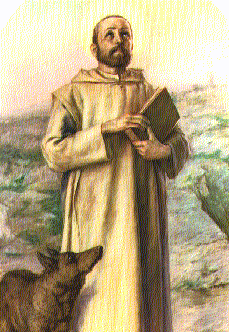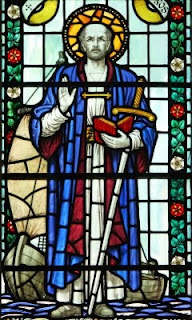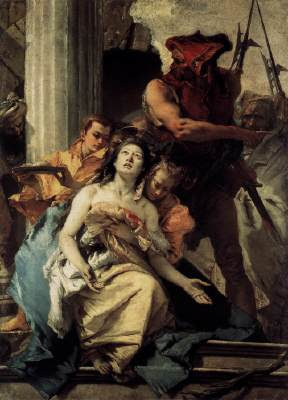The following story is from St. Patrick's Purgatory, by Shane Leslie, published in 1917, and discarded by my parish library a few years ago. Please pardon my conceit of bolding and coloring the lines that particularly struck me.
Saint Dabheoc's feast day is probably today or on the 28th; not much information is available online.
+++
Now, how
Patrick, the love-friend of Jesus, came in his wanderings to Derg and remained for forty days and forty nights on the island is well remembered in Ireland, and how the loneliness of God came upon him, and how, for all his trial and sorrow, he saw visions beyond the dreams of men.
Fewer have remembrance of Dabheoc, the
gilly of heaven, who came on Patrick's footsteps and stayed to pray till his own death. With Dabheoc came others of a like mind and served him in the rough house of stone he had built.
By the beauty of their living and by the power of their penance they had the most of the people won away from the Druids. But the fight between them was a fierce and quenchless one while it raged, for the old hill sorcery was hard on the Saints to conquer. For a while the terrible Druids had been seen moving in the mountains near by and their rites were still offered amid the trembling thickets, but Dabheoc feared them little, and held his own. Do what they might, he laid altar against blood-stone, and chant against rune, and prayer against curse, till in the end the old Druids wandered away, and the last of them died alone upon the hills.
So was the first battle of the Faith won, and as years slipt by only Dabheoc was left of those warrior monks, for some had died by the wild elements and others by their hard penances, and others very fearfully in the fire of the Druids.
There was a long band of young men who made their way over the mountains to join the rule. Though they found it hard to the body, it seemed sweet enough to the soul. But their number increased, and no little strength and prosperity was added to them. The younger brethren built wicker huts of strong woven twigs, and laid out an apple-garden and a herb garden. Above all the work of their hands was the great chapel of timber wood. They had raised it, every beam, by their own labour, and they had filled it with the untiring song of their lips. Day by day, like the bee-folk in the heather, they followed out their chosen rule and kept their lives sweet with activity. Some had turned to the digging of soil, and planted seeds and herbs, till they had won to themselves the wisdom of plants and the healing of leaves.
Others betook them to writing on parchments and painting the Gospels with colours they had picked off the rocks. In those days the making of books was long and troublesome, even to the wearing away of men's lives. First, there were the designs to be pencilled by the best craftsman in the monastery. And then the others would sit day upon day over one smooth page spreading the little rivers of red and yellow through and round the lettering, little rivers that wound about the pages, with bright purple banks curling and folding in and out, yet never breaking over the line or letting a purple sod drop into the yellow stream.
It was on the initial of Christ that they lavished the whole wealth of their brushes. Round the Sacred Letter with an unbroken exactitude they twined the glorious broidery, line upon line, curve out of curve, wreath into wreath. They gathered into the one page the colours of the sky and the beauty of the earth, the burnished mail of dragons, and the slender shapes of the mountain grass. If men wonder to this day at the love and endurance that wrought such books to perfection, it is because, they do not understand the mind of writers who would have deemed their whole lives too short, and the very blue of heaven and the red of their own blood unworthy stuff to emblazon the Name of the Eternal.
Year in and year out they fashioned their Gospels and sent them hanging around the necks of missionaries into the broad world beyond. In aftertime these same books and their metal coverings were found as far apart as the plains of Italy and the white floes of Iceland. A strange and lovely witness to those same children of Patrick, who mingle their sleep in the vineyards of the south and in the ice-beds of the north.
Summer and winter, it was always harvest time to them, and the while they laboured, their brethren in the monasteries of Ireland fashioned the wherewithal of their reaping.
It was over such as these that Dabheoc ruled till he reached his old age, great and honoured among all the houses of Ireland. Calm were his last years, but, although he told it not, there was a dark grief in the well of his heart. He was troubled because he was soon to go out of the world, and yet he had never seen any vision of the world that was to come.
He had spent his life, as the other saints of Ireland, in holy combat with his own soul. Many had he trained to bear the brown robe and the heavy cord. Many had already reached heaven in the light of his counselling. Still the vision that he yearned was lacking to his eyes. Often he had felt in his heart the Holy Powers that move in the world and above the world, but never once had any passed into the sight of his eyes. Visions had come upon the other brethren. Some had seen
the faithful sitting in great joy, and others had seen
the souls in Purgatory wrestling to their perfection. Even among the youngest of them was one who had seen the angel folk standing on the white hills at sunrise. But Dabheoc stretched out his hand in vain to gather the dream-fruit that hangs from the wall of another world. It was not for him, though he had kept vigil in his high mountain seat that lies this day between Derg and Erne. No whisper came to the weary ears of the watcher of the lakes. No sign entranced his eyes. His prayers, his fasts, his vigils, all seemed to break upon the bar of heaven like lost birds in a storm.
Sometimes a sore weariness would come upon him, and even a smoulder of anger rise in his heart, but not for long, so well had the Saint learnt to trample his own passions into the dust, and so rule the brethren. Beati qui non viderunt he would often say, yet oftener would he wish that he was not so blessed.
There came a day when Dabheoc sat in his wattled cell watching the gardened slope that led down to the water edge. A well-mounded rampart ran round the close. Now and again a heavy-robed figure passed across. The hush of Vespertide had fallen, and the quiet as of many tasks done. Dabheoc turned his eyes sadly over the old book satchels that were hanging on the wall. How many hours of his were stored away in them to the use of other men? How much of his sight had been woven into those pages?
When his eyes turned back to the doorway, he saw a Pilgrim standing there. He, too, carried a brown robe, but it was thickened with the dust of white roads and His feet lay bruised between their sandals. His body seemed weak with journeying and in need of refreshment. In His eyes alone there was no weariness, they were deep and beautiful and blue as the skies of Italy.
"Enter, friend, enter; this is a house of rest," said the Saint, " is it very far that thou hast come?"
"
A long and a weary way, Dabheoc, ruler of the Culdees," replied a voice of great sweetness.
"Is it peace that thou bearest with thee, stranger, for mine eyes are too dim to read the faces of men?"
"
My peace have I brought these many years to all that would have it," the sweet voice began again. "
I have brought my peace for thee, Dabheoc, for all the fret that is on thy heart."
"I see that thou canst read the mind of a man's heart. Art thou ruler of a religious order?"
"
Yes, of the greatest of the orders, the Order of the Wayfarers."
"What is thy quest, dear stranger?"
"
I have come to find my friends."
"Who are thy friends?"
"
My friends are all the Saints of Ireland who are born and are yet to be born."
"I do not understand what thou wouldst say, but I see that thou art older than any here though thou hast come as a Pilgrim, perchance thou hast memory of our holy Father Patrick?"
"
Before Patrick was, I am." The voice of the Pilgrim spoke like a bell far off.
Then the old Saint felt that it was no ordinary man his old eyes were striving to see. His whole soul struggled out to meet the Stranger standing at the doorway. A feeling of peace and yet delirious joy was upon him. He could only see
the two eyes that they looked upon him with love. It seemed then as if his poor spirit were fluttering over those pools of
calm unmoved Divinity. Then the wondrous vision past from his eyes and he was looking dimly to the blue waters beyond.
He rose and went down to the water side as fast as his old age would let him. As he crossed the mound he inquired of each brother he met if they had seen which way the Pilgrim had passed, but no one had seen ought on the island that day. Not once, but several times, the old man passed up the island with tears of joy brimming from his eyes. There was no footprint to be seen, but on a bare rock he saw a little wisp of thorn and the red drops falling into the dust beside.
That summer Dabheoc died at Derg, with the vision still in his dark sight, and he was buried under the thorn tree by the other brethren.
Beautiful was the stone cross they carved above him, Dabheoc, the Saint of Derg, who had seen the Holy Wayfarer in the twilight of his years.

Labels: Irish, saints













